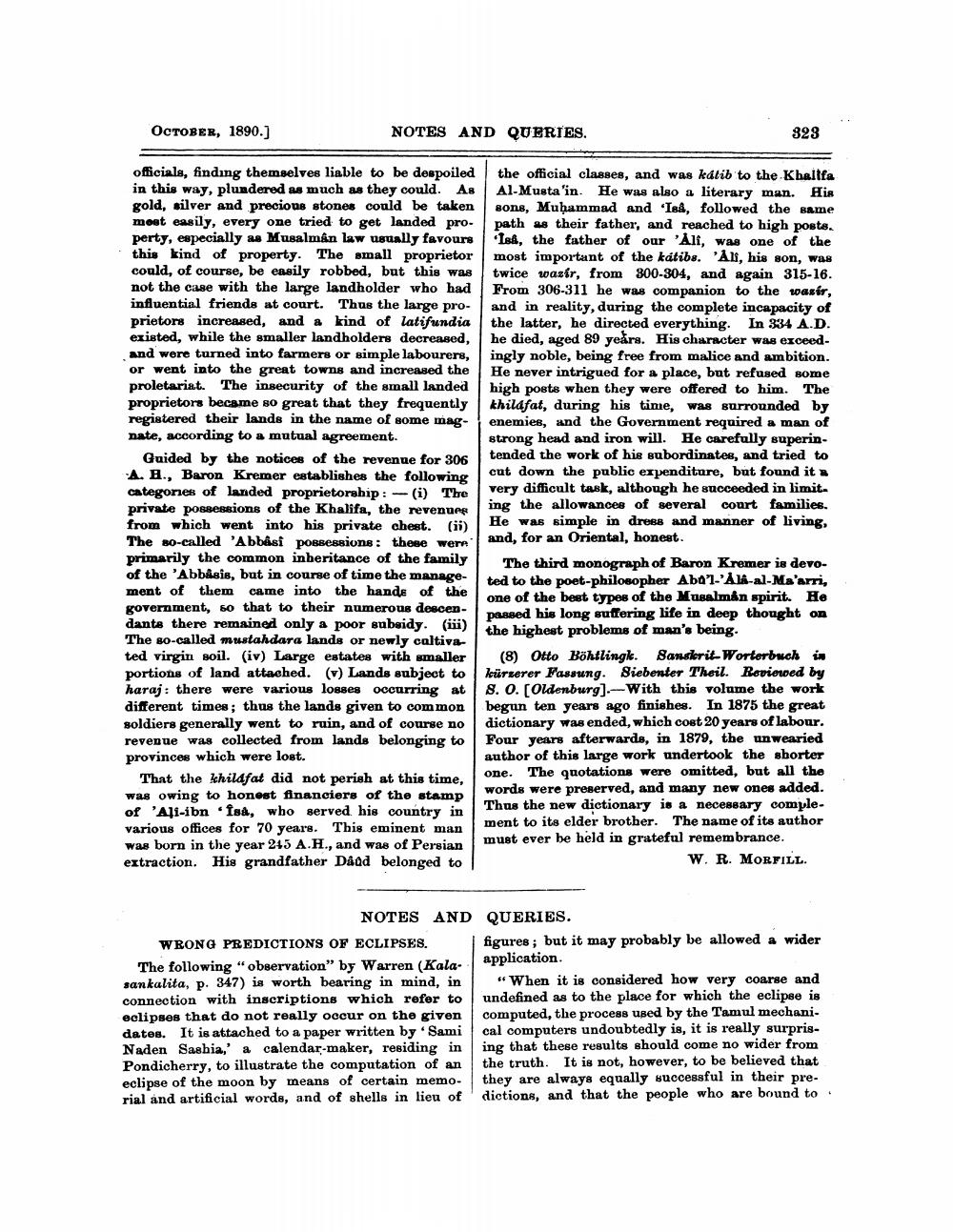________________
OCTOBER, 1890.]
NOTES AND QUERIES.
officials, finding themselves liable to be despoiled in this way, plundered as much as they could. As gold, silver and precious stones could be taken mest easily, every one tried to get landed property, especially as Musalmân law usually favours this kind of property. The small proprietor could, of course, be easily robbed, but this was not the case with the large landholder who had influential friends at court. Thus the large proprietors increased, and a kind of latifundia existed, while the smaller landholders decreased, and were turned into farmers or simple labourers, or went into the great towns and increased the proletariat. The insecurity of the small landed proprietors became so great that they frequently registered their lands in the name of some magnate, according to a mutual agreement.
Guided by the notices of the revenue for 306 A. H., Baron Kremer establishes the following categories of landed proprietorship: (i) The private possessions of the Khalifa, the revenues from which went into his private chest. (ii) The so-called 'Abbasi possessions: these were primarily the common inheritance of the family of the 'Abbasis, but in course of time the management of them came into the hands of the government, so that to their numerous descen
dants there remained only a poor subsidy. (iii) The so-called mustahdara lands or newly cultivated virgin soil. (iv) Large estates with smaller portions of land attached. (v) Lands subject to haraj: there were various losses occurring at different times; thus the lands given to common soldiers generally went to ruin, and of course no revenue was collected from lands belonging to provinces which were lost.
"
That the khilafat did not perish at this time, was owing to honest financiers of the stamp of 'Ali-ibn Isa, who served his country in various offices for 70 years. This eminent man was born in the year 245 A.H., and was of Persian extraction. His grandfather Dâûd belonged to
NOTES AND
WRONG PREDICTIONS OF ECLIPSES. The following "observation" by Warren (Kala-sankalita, p. 347) is worth bearing in mind, in connection with inscriptions which refer to eclipses that do not really occur on the given dates. It is attached to a paper written by 'Sami Naden Sashia,' a calendar-maker, residing in Pondicherry, to illustrate the computation of an eclipse of the moon by means of certain memorial and artificial words, and of shells in lieu of
323
the official classes, and was katib to the Khalifa Al-Musta 'in. He was also a literary man. His sons, Muḥammad and Iså, followed the same path as their father, and reached to high posts. Is, the father of our 'Ali, was one of the most important of the kátibs. 'Ali, his son, was twice wasir, from 300-304, and again 315-16. From 306-311 he was companion to the wasir, and in reality, during the complete incapacity of the latter, he directed everything. In 334 A.D. he died, aged 89 years. His character was exceedingly noble, being free from malice and ambition. He never intrigued for a place, but refused some high posts when they were offered to him. The khilafat, during his time, was surrounded by enemies, and the Government required a man of strong head and iron will. He carefully superintended the work of his subordinates, and tried to cut down the public expenditure, but found it a very difficult task, although he succeeded in limit. ing the allowances of several court families. He was simple in dress and manner of living, and, for an Oriental, honest.
The third monograph of Baron Kremer is devoted to the poet-philosopher Aba'l-'Ala-al-Ma'arri, one of the best types of the Musalman spirit. He passed his long suffering life in deep thought on the highest problems of man's being.
(8) Otto Böhtlingk. Sanskrit-Worterbuch in kürzerer Fassung. Siebenter Theil. Reviewed by 8. O. [Oldenburg]-With this volume the work begun ten years ago finishes. In 1875 the great dictionary was ended, which cost 20 years of labour. Four years afterwards, in 1879, the unwearied author of this large work undertook the shorter The quotations were omitted, but all the words were preserved, and many new ones added. Thus the new dictionary is a necessary complement to its elder brother. The name of its author must ever be held in grateful remembrance. W. R. MORFILL.
one.
QUERIES.
figures; but it may probably be allowed a wider application.
"When it is considered how very coarse and undefined as to the place for which the eclipse is computed, the process used by the Tamul mechanical computers undoubtedly is, it is really surprising that these results should come no wider from the truth. It is not, however, to be believed that they are always equally successful in their predictions, and that the people who are bound to




